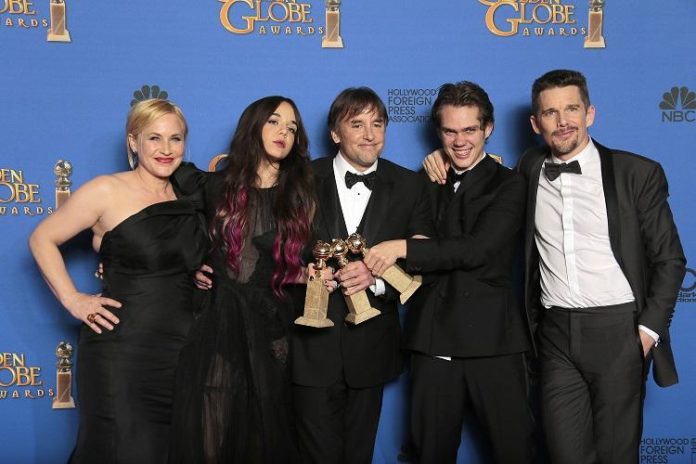It’s no surprise when films premiere at Sundance and other film festivals that they become big contenders during award season. “Boyhood,” a highly acclaimed movie written and directed by Richard Linklater (“Dazed and Confused,” “School of Rock”) is no exception.
Unless someone mentioned to you that there is a movie out that took 12 years to film, you may not have heard of this independent film. That’s what I first heard about “Boyhood,” and my curiosity about this film consumed me. Making an experiment out of a film and taking such a risk really paid off for everyone involved. Trust me, you should see this film.
The movie begins in 2002 when Mason Evans Jr., played by newcomer Ellar Coltrane, was just six years old. As you can guess by the title, the movie is somewhat centered around his character growing up. But it is so much more than that. As you watch Mason actually grow up before your eyes, you also get to see his older sister Samantha, played by Richard Linklater’s daughter, Lorelei, grow up too. The parents of the two children are played by Patricia Arquette (“Medium,” “Holes”) and Ethan Hawke (“Dead Poets Society,” “Training Day”) as Olivia and Mason Sr., respectively.
The film does a great job of naturally showing the years pass. Scenes will happen one after another and unless you pay close attention to the actor’s hair or the children’s heights, you don’t even realize for quite some time that they are getting older.
It feels like you are watching a home video or documentary of a real family’s life. No special effects are used. The film is raw, with artistic camera angles and simple dialogue. It’s easy to get lost in the characters’ stories and believe it all.
Over 12 years, you examine Mason growing up, fighting with his sister, Samantha, having trouble at school and struggling with moving a few times. Samantha makes different friends, has some crazy colored hair at one point and begins to become a young woman who reminds me of a mellow hippie chick from the 60s.
Olivia is already separated from Mason Sr. when the story begins, and is a single mom taking care of the two children while Mason Sr. gets them on the weekends. It’s easy to identify the difference between the two from the beginning and how the children react to them. Mason Sr. is the fun dad that wants to go out and do stuff with his children, and Olivia is the working mother who struggles to pay the bills and cooks dinner each night after a long day at work.
The family deals with situations that many families today face, like divorce, love, sexuality, money issues, friendship, etc. There is no initial plot to the story; Linklater didn’t even have the script finalized when filming began in 2002.
He had the characters created and knew what the ending scene would be, but left the in-between to be explored by the actors and himself. Filming ended mid-2013, which meant the cast would not see each other for a week or two each year anymore to continue “Boyhood’s” epic 12-year story.
My favorite parts of the film are when Mason Jr. is in high school and is struggling to find his identity. I noticed he did not have many speaking lines when he was a child and the story focused more around what was happening with the members of his family.
Once he hit high school, the shift went from them to him. He finds a love in photography and experiences a breakup with his girlfriend over her cheating on him with a college joke. Mason Jr. chooses a college as far away from his family as possible, but still in Texas so his parents can pay in-state tuition. The last scene is really beautiful and the film ends with dialogue between Mason Jr. and a girl named Nicole about seizing the moment.
If you are a film buff who likes to be up-to-date on all the buzzworthy films during award season, I suggest you see this. “Boyhood” has already won at the Golden Globe Awards (Best Motion Picture- Drama, Best Director and Best Supporting Actress) and is expected to pick up more honors at the Academy Awards. It’s definitely an indie-flick and is not for someone who craves action or horror movies. “Boyhood” is personal, and can really change your perspective on life and growing up.








